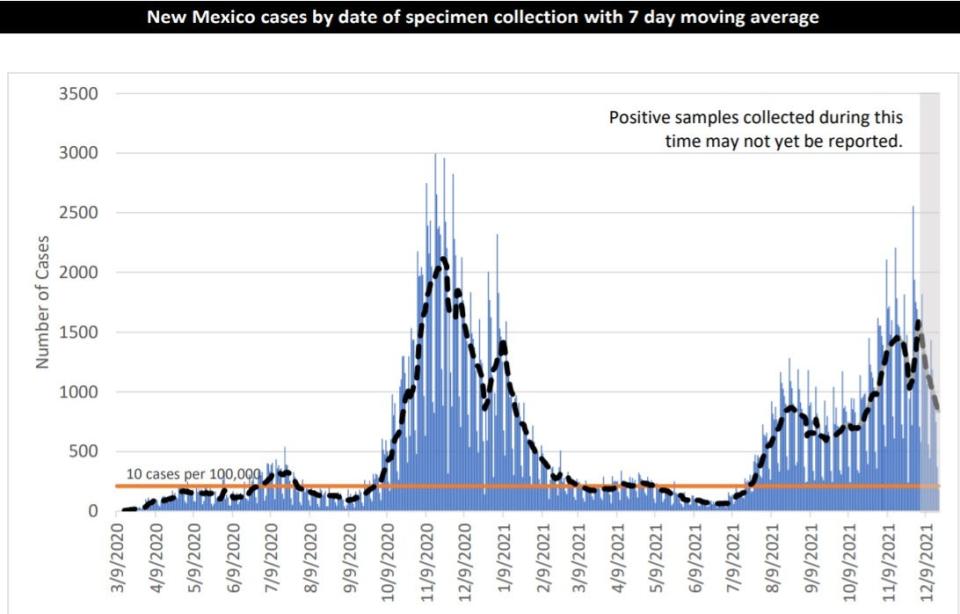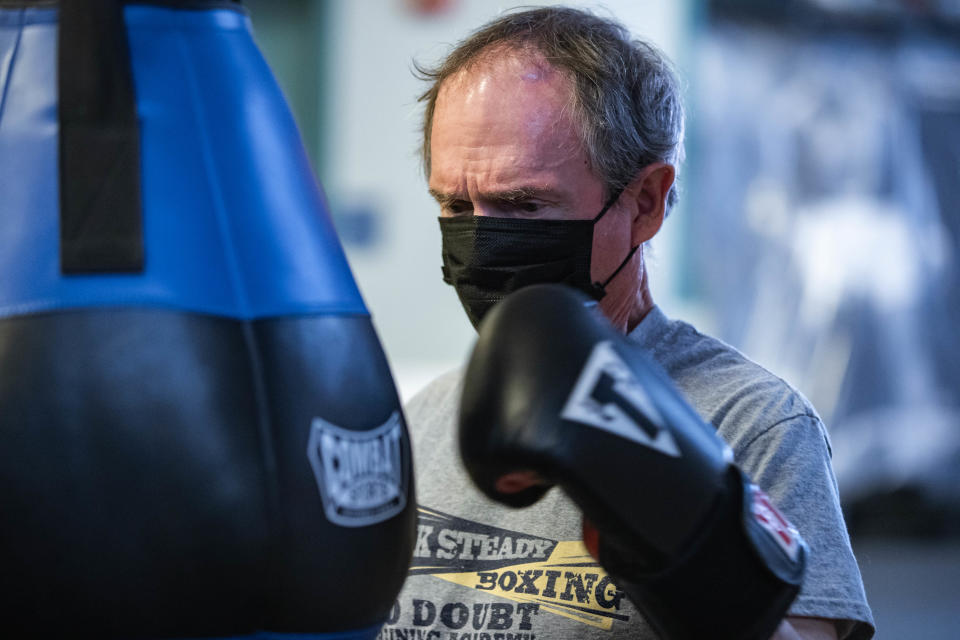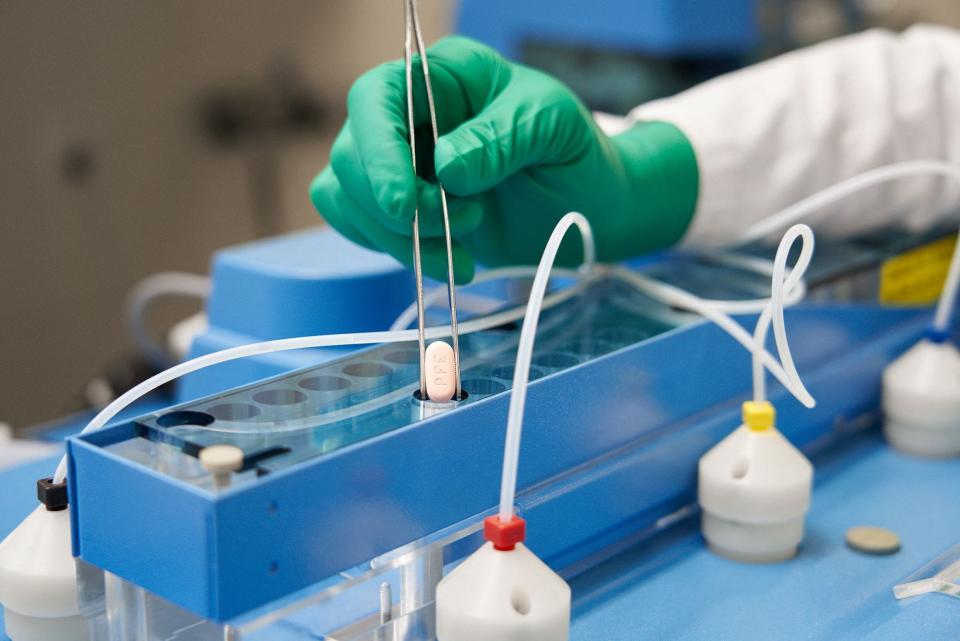Omicron in New Mexico: What we know about the COVID variant from state health officials
It is too soon to tell how prevalent the new omicron strain of the SARS-CoV-2 coronavirus is in New Mexico, but it may complicate one tool the state has relied on to keep COVID-19 patients out of its hospitals.
The new variant has quickly overtaken delta as the dominant strain of the coronavirus in the United States, proving even more contagious than delta, which has fueled a surge in New Mexico cases since July that sits at what state epidemiologist Dr. Christine Ross described as "an uncomfortable plateau" this week.
The state confirmed its first case of COVID-19 sequenced to the variant on Dec. 12. During a Dec. 22 news conference, Ross said health officials were investigating more suspected cases, but it was too soon to tell how quickly it was spreading in a state where eight hospitals have enacted crisis standards of care, contending with unprecedented stress on the state's healthcare delivery system.

It also remains unclear whether the new variant, identified by the World Health Organization on Nov. 26, causes more severe illness, although early data reported from South Africa suggests not.
Omicron may be resistant to antibody treatments
Early reports suggest that more individuals who have been vaccinated are contracting omicron than previous variants, but epidemiologists say unvaccinated populations remain the chief fuel for outbreaks that can overwhelm hospitals, as has been the case in New Mexico.
The state health department has been forced to enable crisis standards of care, permitting hospitals to make extraordinary decisions about how to allocate resources, twice during the COVID-19 pandemic. Currently, eight hospitals in the state have enacted CSC.
Another troubling trend are reports that omicron is resistant to monoclonal antibody treatments that New Mexico officials say have reduced chances of hospitalization for COVID-19 by 75 percent.

During the same news conference, Deputy Health Secretary Dr. Laura Parajón noted that "we are a little concerned … the omicron variant may not be treated by our current monoclonal antibodies."
Once it becomes the dominant strain she said "we do have to rethink … how we need to react and respond," and she said the DOH's medical advisory group would be meeting Thursday morning to assess the latest data and options.
Monoclonal antibody treatments infuse patients with lab-produced antibodies that mimic the body's immune response. Several of the therapies are available under emergency use authorizations by the Food and Drug Administration.
"It’s too early to know if there is any treatment difference with respect to omicron," Presbyterian Healthcare Services infusion services director Dr. Anand Pierce wrote the Las Cruces Sun-News. "We have not noticed anything anecdotally."
Pending further knowledge about the variant, Pierce said the Albuquerque facility is proceeding with all available monoclonal antibody treatments in an effort to treat COVID-19 infections on an outpatient basis.

The treatments are recommended for individuals over the age of 12 who test positive for COVID-19 and have mild to moderate symptoms and/or risk factors for severe disease. The treatments have been a key pressure valve as the state struggles with overwhelming patient loads at hospitals statewide.
How are New Mexico hospitals treating those with Omicron symptoms?
Other strains of SARS-CoV-2 have been resistant to antibody treatment, including the gamma variant, which had the highest proportion of hospitalizations — 24 percent — on the state's most recent genomic sequencing report.
The beta variant, which has not been observed in New Mexico since July, was also resistant to antibody treatment as well as vaccine-induced immunity.
Omicron, however, appears to more infectious by far, and resistant to two of the most commonly used antibody treatments.
"They appear to be minimally active or may not offer any neutralization of the virus of the omicron variant," Ross told reporters, referring specifically to combined therapies Bamlanivimab/Etesevimab and Casirivimab/Imdevimab (also known by brand name REGEN-COV).
Another common therapy, called sotrovimab, reportedly remains effective, but supplies of the product are tight.

"We have sotrovimab on hand (at Presbyterian) but are currently reserving that supply for when omicron is confirmed to have a significant presence," Pierce wrote.
"If/when we are only able to use sotrovimab, we are expecting that supplies will be tighter for a while until the manufacturer can increase output (which they are planning on doing)," he continued.
Pierce also expressed hope, along with New Mexico health officials, in a newly authorized oral therapy, Paxlovid, which reduced severe disease by nearly 90 percent in clinical trials. Supplies of the new drug are expected to remain tight for months as well, with the federal government promising to distribute 265,000 treatment courses (consisting of 30 pills taken over five days) across the country in January.
"We'll make adjustments as needed," Ross said, while emphasizing that the three main antibody treatments "are highly effective against the delta variant — and delta continues to be predominant here."
Algernon D'Ammassa can be reached at 575-541-5451, adammassa@lcsun-news.com or @AlgernonWrites on Twitter.
This article originally appeared on Las Cruces Sun-News: Omicron may resist treatments that reduce hospitalizations

